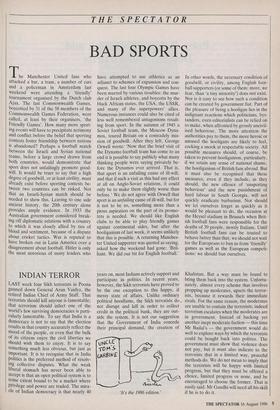THE SPECTATOR
BAD SPORTS
The Manchester United fans who attacked a bar, a tram, a number of cars and a policeman in Amsterdam last weekend were attending a 'friendly' tournament organised by the Dutch club Ajax. The last Commonwealth Games, boycotted by 31 of the 58 members of the Commonwealth Games Federation, were called, at least by their organisers, 'the Friendly Games'. How many more sport- ing events will have to precipitate acrimony and conflict before the belief that sporting contests foster friendship between nations is abandoned? Perhaps a football match between the Israeli and Syrian national teams, before a large crowd drawn from both countries, would demonstrate that Sport does not unfailingly promote good- will. It would be truer to say that a high degree of goodwill, or at least civility, must already exist before sporting contests be- tween two countries can be risked. Not that an Israeli-Syrian match should be needed to show this. Leaving to one side ancient history, the 20th century alone provides ample evidence. In 1933 the Australian government considered break- ing off diplomatic relations with a country to which it was closely allied by ties of blood and sentiment, because of a dispute about cricket tactics. War is reputed to have broken out in Latin America over a disagreement about football. Hitler is only the most notorious of many leaders who have attempted to use athletics as an adjunct to schemes of expansion and con- quest. The last four Olympic Games have been marred by various troubles: the mur- der of Israeli athletes, and boycotts by the black African states, the USA, the USSR, and many of the superpowers' allies. Numerous instances could also be cited of less well remembered antagonisms result- ing from sport. In the autumn of 1945 a Soviet football team, the Moscow Dyna- mos, toured Britain on a comradely mis- sion of goodwill. After they left, George Orwell wrote: 'Now that the brief visit of the Dynamo football team has come to an end it is possible to say publicly what many thinking people were saying privately be- fore the Dynamos ever arrived. That is, that sport is an unfailing cause of and that if such a visit as this had any effect at all on Anglo-Soviet relations, it could only be to make them slightly worse than before.' We do not agree with Orwell that sport is an unfailing cause of but for it not to be so, something more than a pious aspiration on the part of its promo- ters is needed. We should like English clubs to be able to play friendly games against continental sides, but after the hooliganism of last week, it seems unlikely that this is possible. A returning Manches- ter United supporter was quoted as saying, asked how the weekend had gone: 'Bril- liant. We did our bit for English football.' In other words, the necessary condition of goodwill, or civility, among English foot- ball supporters (or some of them: more, we fear, than 'a tiny minority') does not exist. Nor is it easy to see how such a condition can be created by government fiat. Part of the pleasure of being a hooligan lies in the indignant reactions which politicians, bys- tanders, even editorialists can be relied on to make, when affronted by grossly uncivil- ised behaviour. The more attention the authorities pay to them, the more heroic or amused the hooligans are likely to feel, cocking a snook at respectable society. All possible measures should, of course, be taken to prevent hooliganism, particularly, if we retain any sense of national shame, the hooliganism of British fans abroad. But it must also be recognised that these measures, even if they include, as they should, the new offence of 'unsporting behaviour' and the new punishment of hard labour in South Georgia, will not quickly eradicate barbarism. Nor should we let ourselves forget as quickly as it would be pleasant to do, the occasion at the Heysel stadium in Brussels when Brit- ish football fans were responsible for the deaths of 39 people, mostly Italians. Until British football fans can be trusted to behave better than that, we should not wait for the Europeans to ban us from 'friendly' games as well as the European competi- tions: we should ban ourselves.










































 Previous page
Previous page